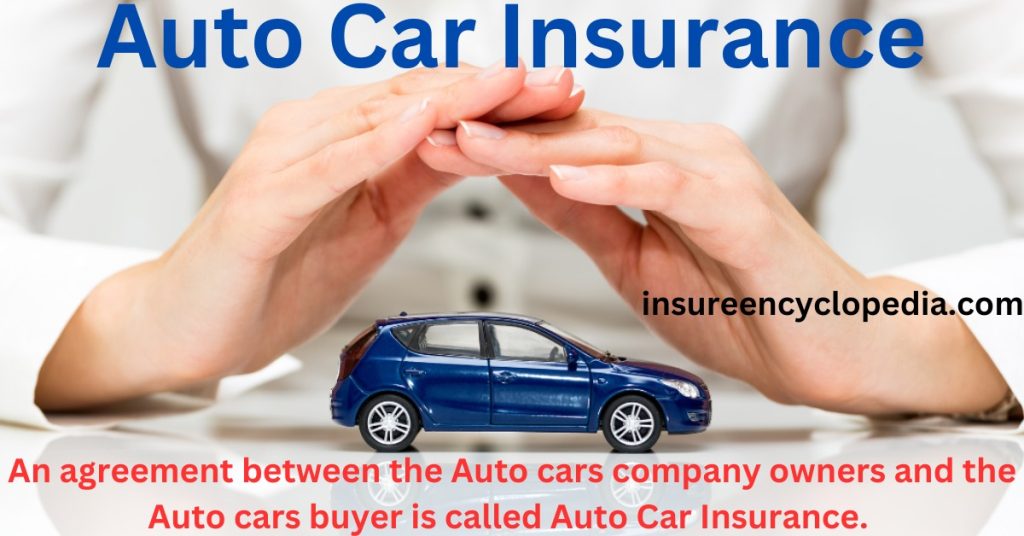Introduction of Auto Car Insurance:
Auto Car Insurance is an agreement between the auto cars company owners and the Auto cars buyer is called Auto Car Insurance. In exchange for regular premium payments, the insurer agrees to cover specific financial losses resulting from car accidents, theft, or other covered perils. Owning a car is a significant milestone, but it also comes with responsibilities, including auto insurance. As a first-time car owner, understanding the basics of auto insurance can be overwhelming. This guide will break down the essentials to help you make informed decisions.
Why is Auto Car Insurance Important?
- Legal Requirement: In many jurisdictions, auto insurance is mandatory by law.
- Financial Protection: It safeguards you from substantial financial burdens in case of accidents, theft, or property damage.
- Peace of Mind: Knowing you’re protected can alleviate stress and anxiety.
Key Components of Auto Car Insurance:
- Liability Coverage: This covers bodily injury and property damage to others if you’re at fault in an accident.
- Collision Coverage: These will help the buyer of cars in case of any damaging and accidental in natural and non-natural.
- Comprehensive Coverage: This covers damage to your vehicle caused by non-collision events, such as theft, vandalism, or natural disasters.
- Uninsured/Underinsured Motorist Coverage: This protects you if you’re involved in an accident with a driver who is uninsured or underinsured.
Choosing the Right Auto Car Insurance Policy:
- Assess Your Needs: Consider factors like your budget, the value of your car, and your driving habits.
- Shop Around: Get quotes from multiple insurance companies to compare rates and coverage options.
- Understand Your Policy: Read your policy carefully to know what’s covered and what’s excluded.
- Consider Additional Coverage: You may want to explore options like roadside assistance, rental car reimbursement, and medical payments coverage.
Tips for First-Time Car Owners:
- Maintain a Good Driving Record: A clean driving history can significantly lower your premiums.
- Take a Defensive Driving Course: Completing a defensive driving course can often result in discounts.
- Bundle Policies: Combining your auto insurance with other policies, like home or renters insurance, can lead to savings.
- Choose a Higher Deductible: A higher deductible can lower your premium, but you’ll pay more out-of-pocket in case of a claim.
- Review Your Policy Regularly: Your insurance needs may change over time. Review your policy annually to ensure it still meets your requirements.
Advanced Auto Car Insurance Strategies:
As an experienced driver, you likely have a solid understanding of basic Auto Car Insurance. However, there are advanced strategies you can employ to further protect your assets and optimize your coverage.
Understanding Comprehensive Coverage of Auto Car Insurance:
Comprehensive coverage is a vital component of a robust Auto Car Insurance policy. It safeguards your vehicle against a wide range of non-collision perils, including:
- Theft: protection of your money loss in case of stolen and loose.
- Vandalism: Covers damage caused by malicious acts, such as keying or broken windows.
- Natural Disasters: Protects against damage from events like hail, floods, earthquakes, and wildfires.
- Animal Collisions: Covers damage caused by collisions with animals, such as deer or raccoons.
Advanced Strategies for Experienced Drivers of Auto Car Insurance:
- High-Value Vehicle Coverage:
- Agreed Value Coverage: This option allows you to set a specific value for your vehicle, ensuring you receive the full agreed-upon amount in case of a total loss.
- Classic Auto Car Insurance: If you own a classic or antique car, specialized insurance policies can provide comprehensive coverage tailored to your unique needs.
- Gap Insurance:
- Covers the Difference: If your vehicle is totaled, gap insurance covers the difference between your car’s actual cash value (ACV) and the outstanding loan balance.
- Rental Car Reimbursement:
- Temporary Transportation: This coverage reimburses you for rental car expenses while your vehicle is being repaired after a covered claim.
- Roadside Assistance:
- Emergency Services: This optional coverage provides 24/7 roadside assistance, including towing, jump-starts, and lockout services.
- Umbrella Insurance:
- Additional Liability Protection: Umbrella insurance provides extra liability coverage beyond your auto and home insurance policies. This can be crucial in case of a significant lawsuit.
Additional Considerations for Auto Car Insurance:
- Review Your Policy Annually: As your needs and circumstances change, it’s essential to review your policy and make adjustments as necessary.
- Consider Discounts: Explore potential discounts offered by your insurer, such as good driver discounts, multiple policy discounts, or low-mileage discounts.
- Work with a Knowledgeable Agent: A skilled insurance agent can help you understand complex coverage options and tailor a policy to your specific needs.
Auto Car Insurance for Teen Drivers:
Teen drivers are statistically more likely to be involved in accidents, which can lead to higher insurance premiums. Here are some tips to help you manage auto insurance costs for teen drivers:
- Good Student Discounts: Encourage your teen to maintain good grades to qualify for discounts.
- Driver’s Education Courses: Completing a driver’s education course can often lead to lower premiums.
- Limited Mileage Discounts: If your teen doesn’t drive frequently, consider a low-mileage discount.
- Consider Telematics: Telematics devices can track your teen’s driving habits and reward safe driving behavior with lower rates.
Auto Car Insurance for seniors:
As you age, your driving habits and needs may change. Here are some factors to consider when choosing auto insurance as a senior:
- Review Your Coverage: Ensure your policy still meets your needs, especially if you’re retiring or reducing you’re driving.
- Consider Low-Mileage Discounts: If you’re driving less, explore low-mileage discounts.
- Shop Around for Discounts: Many insurance companies offer discounts for seniors, such as AARP membership discounts.
- Defensive Driving Courses: Taking a defensive driving course can help you maintain your driving skills and potentially lower your premiums.
Auto Car Insurance for Business Owners:
If you use your vehicle for business purposes, you’ll need specialized auto insurance coverage. Here are some key considerations:
- Commercial Auto Car Insurance: This type of insurance covers vehicles used for business purposes, such as delivery trucks, company cars, or work vans.
- Business Liability Coverage: This protects your business from liability claims if you’re involved in an accident while conducting business.
- Hired and Non-Owned Auto Liability: This coverage protects your business if employees use their personal vehicles for work-related purposes.
Auto Car Insurance for Classic Cars:
Classic cars are often collector’s items with significant value. Here are some Auto Car Insurance tips for classic car owners:
- Agreed Value Coverage: This type of coverage allows you to set a specific value for your classic car, ensuring you’re compensated fairly in case of a total loss.
- Specialized Insurance Companies: Consider working with insurance companies that specialize in classic car insurance.
- Storage Discounts: If you store your classic car in a secure location, you may qualify for storage discounts.
- Limited Mileage Coverage: If you only drive your classic car occasionally, limited mileage coverage can save you money.
Rental car reimbursement coverage is an optional add-on to your Auto Car Insurance policy that helps cover the cost of a rental car if your vehicle is damaged in a covered accident and is unable to be driven. This coverage can be a lifesaver if you rely on your car for daily transportation and need a replacement while your vehicle is being repaired.
Covered Event: Your vehicle is involved in a covered accident, such as a collision or a theft.
- Vehicle Repair or Replacement: Your vehicle is either being repaired or replaced due to the covered event.
- Rental Car Expense: You incur costs for a rental car while your vehicle is unavailable.
- Insurance Reimbursement: Your insurance company reimburses you for the cost of the rental car, up to a certain limit, as outlined in your policy.
Important Considerations Auto Car Insurance:
- Policy Limits: Rental car reimbursement coverage has limits on the daily amount and the total amount you can claim per incident.
- Coverage Duration: The coverage typically lasts until your vehicle is repaired or replaced, or until the policy limit is reached.
- Rental Car Choice: You have the flexibility to choose any rental car company, but you may need to pay upfront and seek reimbursement from your insurer.
- Additional Costs: You may need to cover additional expenses like taxes, fees, and insurance charges for the rental car.
Benefits of Rental Car Reimbursement Coverage:
- Convenience: Ensures you have transportation while your vehicle is being repaired or replaced.
- Financial Protection: Avoids out-of-pocket expenses for a rental car.
- Peace of Mind: Knowing you’re covered in case of an unexpected situation.
Get more Information of Insurance:


